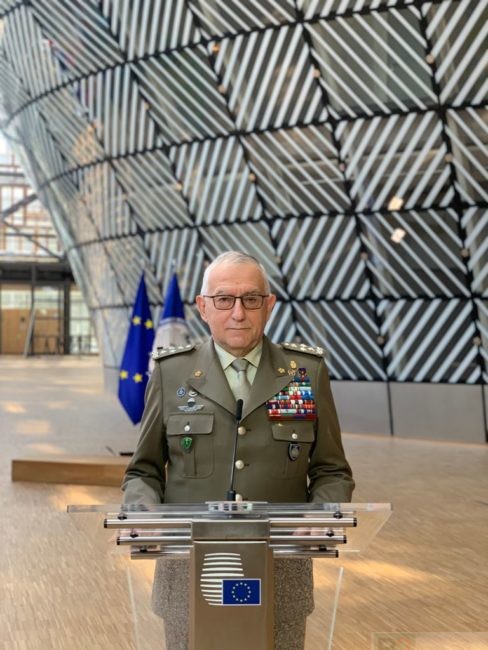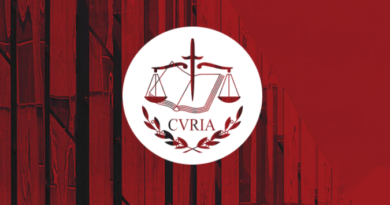[Interview] The voice of the European military. (General Graziano)
(B2 - exclusive) Claudio Graziano chairs the EU military committee. But he is also the defense adviser to the High Representative. And it is full of ideas for improving European defence. As a prelude to the informal meetings at the beginning of September, he entrusts us with his ideas

General Graziano has been Chairman of the EU Military Committee (EUMC) for almost three years (he took office on November 6, 2018). He arrived in Brussels after having worked with the United Nations, NATO and in his country, Italy...
NB: this interview was carried out before the evacuation operation in Afghanistan.
Force generation: the greatest concern of European defense
For the chairman of the military committee, one of the biggest problems of European defense is the generation of forces. That is to say, to ensure that the States provide enough capacities (human and material) for the smooth running of the missions and operations of the European Union in the world. Generating forces is essential “ if you want to be credible ". And with his military expert eye, he says his great regret. " It is difficult to understand why the 27 decide to launch a mission but do not make forces available ". Faced with this, there is changes in procedures to make the commitment more binding ».
Of course, there are some questions about the causes of this low engagement. " Perhaps the Covid-19 also has its responsibility, because we live in special times ". Another hypothesis, maybe some states are not totally aligned with the priorities ". This is where the strategic compass, the document which analyzes the threats to Europe, should have a certain role to play, according to him.
Qualified Majority Voting vs Unanimity
The chairman of the Military Committee says he does not know whether to go from unanimous voting to qualified majority voting to take decisions on defense matters in the Council of the European Union. " It is important to take seriously a level of ambition expressed at the political level. And to transform this political ambition into concrete action, by being ready to deploy and generate forces. It may be that the 27 agree [on an initiative], but that some are not interested in participating. The objective is to find unanimity in principle, in the will to deploy forces. In this context, everyone can participate [in their own way], for example with common funding. »
States that are not very responsive or dilettante
« Sometimes, I complain because Member States are not responsive enough at a specific time. For example, we had problems launching Operation Irini, because it was difficult to find abilities he admits (read: Operation Irini must have the necessary means to carry out its mandate (General Graziano)). He thus points out the differences between political wills and actions. But sometimes, rather than complaining, " il better wait. Europe can do much more ". For example " we should have done more in Libya. But this is rather the responsibility of the Member States ».
We must learn to involve the military in the European Union
The European Union must adjust its strategic autonomy, there is no alternative ". Strategic autonomy, this " is not to be autonomous vis-à-vis someone, but to be able to act when we are alone ". The general is categorical: If NATO does not want to react to a crisis that concerns us and requires our intervention, how can we react as the European Union if we have no autonomy? To lead large peacekeeping operations in the Sahel, in the central Mediterranean, in Mozambique, to extend maritime cooperation from the Gulf of Guinea to the Indo-Pacific..., there is a need for strategic autonomy. »
Need for technological superiority
Another subject on which the Europeans must look into is the development of technological capabilities. Technology is one of the threats hanging over Europe today. While " during the Cold War, no one questioned the technological superiority of the West, this will probably no longer be the case ". " We need technological sovereignty, because technologies will be needed on the ground. China is planning until 2050. We need to think about our technological sovereignty not only for our soldiers, sailors, airmen, to provide them with the best equipment to protect themselves. But also because you don't want to become dependent. We must maintain the technological lead. And in a way we can also balance the competition between the United States and China, and be a benchmark »
Battlegroups: keep or replace?
« I fully agree with the idea of having rapidly deployable forces for the European Union. It would be nice if this was one of the results of the strategic compass. "It would be a group" bigger than battlegroups. These" could, or should, be at the heart of these greatest forces ". " There should be a level ambition to achieve, even if the methodology is still lacking ».
For the general, the name given to this rapid intervention force matters little. What matters, however, is that the battlegroups remain. " Iwe must preserve and improve » existing battlegroups, « before creating a new thing ". The same applies to NATO's Quick Reaction Force (QRF). " No one thinks they are irrelevant. When the time comes, they will be deployed ».
... to be used in different forms
This force could be used in " beaucoup " of case, judges the general, for example " to reinforce a mission in the Sahel temporarily, if there is a crisis in Mali. Or it would be possible to send a group to Mozambique... why not ? "
The success of the new tools depends on the Member States
His two favorite European defense initiatives? The European Defense Fund (EDF) and the Peace Facility. But you have to use them well. On the FEDef, « it is important that the Member States believe in it and that they make the effort to participate in it “, he argues. The ease for peace, she, “ can be a change in the culture of defense ", in particular because it is a new means of financing military operations, and " it's a way to make the missions more believable " - but " it is important that the money is not dispersed but concentrated where there are Common Defense and Security Policy (CSDP) missions and operations ».
(Comments collected by Aurélie Pugnet)
Interview conducted in May 2021, face to face, in English, during the informal meeting of Ministers of Defense.
Read also:
- Austrian general to head EU military committee in June 2022
- Josep Borrell draws lessons from the strategic compass debate
- We must reinvigorate the battlegroups and fill the gaps in operations (military committee)
- Without means for the CSDP, without hard power, the credibility of Europe is in danger (Gen. Graziano)
- Covid-19 is seriously testing our resilience (General Graziano)
- Listen to military advice! (General Graziano, EU Military Committee)



